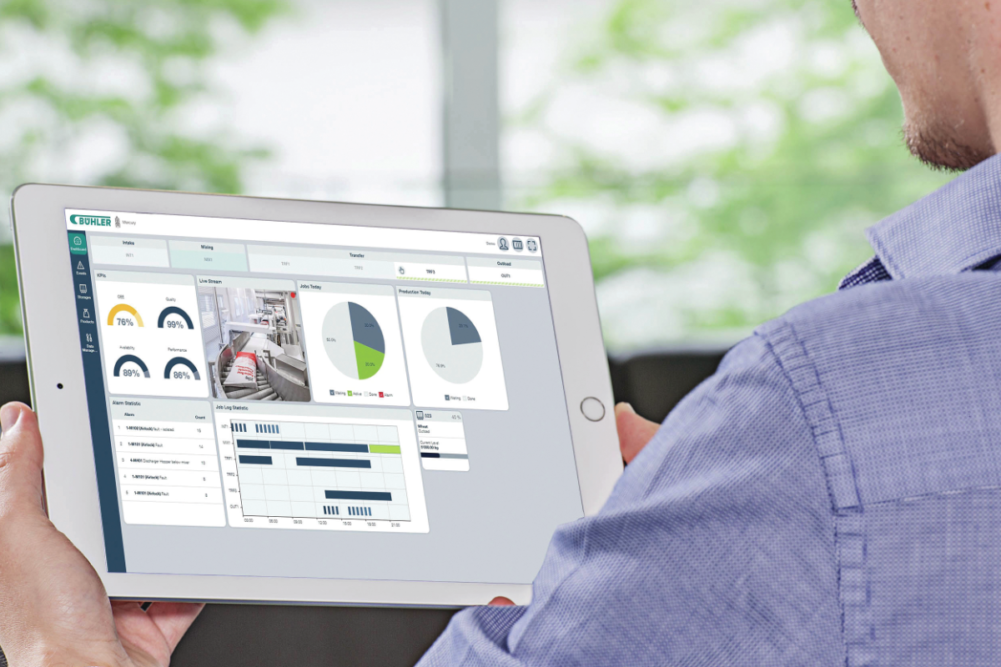Modern flour mills are highly complex systems. Each individual system component, whether it is involved in the arrival of raw materials or in the cleaning, grinding, storage or bagging of the finished product, is a highly sophisticated piece of machinery that works with utmost precision and accuracy.
The only scope left for improvement is in the finer details. To optimize further, one must look at the potential of linking the individual system components together and in the possibilities offered by autonomy.
Uzwil, Switzerland-based Bühler is developing the building blocks for what the company calls the “Smart Mill.” Urs Dübendorfer, a grain milling technologist who has been with Bühler AG for 28 years and is a member of the Smart Mill development team, spoke to World Grain about the progress Bühler is making in this area.
WG: How will digitization change the work of a miller in the coming years? Will it become an office job?

Dübendorfer: No, in fact, just the opposite. All the data and information are collected by online sensors and each sensor has to be calibrated. That is, and will remain, a skilled job for process experts. Data availability is being improved enormously; you will always have the data with you on your mobile device. That means the miller will be even more likely to be in the milling plant. To put it another way, the plant will remain, but the control room will disappear. The amount of office work will be drastically reduced because reports and similar tasks can become “automated.”
WG: Will that make the job of a miller more attractive?
Dübendorfer: Yes, definitely. The milling profession will become even more interesting because it will be even more varied and multifaceted. In addition to milling technology, mechanics, electrics and automation, we are now also adding digital technology. The expertise-required profession will be more diverse, and the miller’s profession will become even more attractive for specialists from other sectors.
WG: Why should a miller engage with digitization?
Dübendorfer: What’s important is understanding that digitization offers the miller in-depth information that has not been available until now. The collection of data in real time also enables you to predict trends and drifts, which gives you the advantage of intervening earlier in the process. For the miller, this means more robust process control and greater support for consistent end-product quality.
WG: How would you describe a Smart Mill?
Dübendorfer: In a Smart Mill, many of the process steps are monitored by sensors. Data from the different parts of the system are collected centrally and analyzed using special algorithms. The most important feature of a Smart Mill is that if deviations from the specifications are detected, the system automatically makes corrections and adapts individual process steps. The Smart Mill is becoming more automated and autonomous — comparable with self-driving cars.
WG: How far along are you and your team in developing the Smart Mill?
Dübendorfer: We’ve already achieved a great deal in the years that we’ve been working on the Smart Mill, but we’re aware that we still have a long way to go. We’re currently in the phase of being amazed by all the possibilities. At the same time, we’re preparing a solid structure to build on with our Bühler Insights platform. We’re the only supplier in our area to be ISO 27001-certified.
WG: Many highly automated mills already exist. There’s already a wealth of experience in that area. How is this different?
Dübendorfer: It’s true that many mills around the world already have automated solutions. However, they are all only partial solutions, the majority of which are standalone. The individual processes have not yet been linked together and work in isolation, and there’s little regulation. The more we look into the issue of centralized autonomy, the more we see how complex the task is. We have already developed various digital solutions. But what’s still missing is the consolidation of all the processes into a “think and command center.”
WG: What are the main challenges?
Dübendorfer: Large amounts of data, and integrating or linking internal and external data, among other things.
WG: Are modern IT systems able to handle large amounts of data?
Dübendorfer: Sure, but if you monitor every process with sensors, it generates almost unimaginable quantities of data. The lists are endless. They far exceed the analysis capabilities of humans. That means it’s got to be done by computer. However, that requires special algorithms, which have to be developed if we don’t know them yet. These algorithms work better the more varied the data are that they receive. And that takes us to Bühler Insights. It collects the data from different systems anonymously and analyzes it in clusters.
WG: What do you mean by integrating external data?
Dübendorfer: An autonomously operating mill should not only react to detected errors or deviations, it should also be able to be proactive. That means its “brain” should be able to anticipate the mill’s operating condition based on external data such as the weather or the quality of the raw material and activate appropriate measures such as service and maintenance work. We know so much about the various processes involved in the production of flour — from harvesting right through to bagging. If we succeed in linking all these processes together, that will be a big step toward fulfilling the wishes of millers and a big step toward creating the Smart Mill.
WG: What are the most common things that millers require to do their job effectively?
Dübendorfer: When I talk to leading millers, they all want three things: consistent quality, lower costs and complete traceability. That requires smart systems — they support the most consistent product quality possible; they help to use energy and other resources sparingly; they enable the recording of every process; and, in doing so, they also enable complete traceability.
WG: How will the Smart Mill help fulfill these wishes?
Dübendorfer: Because a Smart Mill always works “intelligently” and supports the miller wherever recurring processes are involved. However, even the smartest mill cannot replace entrepreneurial thinking or feeling for the market that any successful miller needs.






